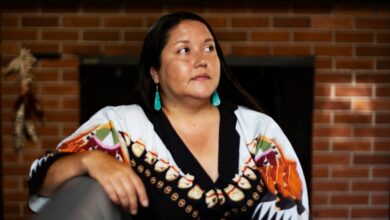NC Promise Saved a University and Grew Two Others. Is It a Model or a Fluke?
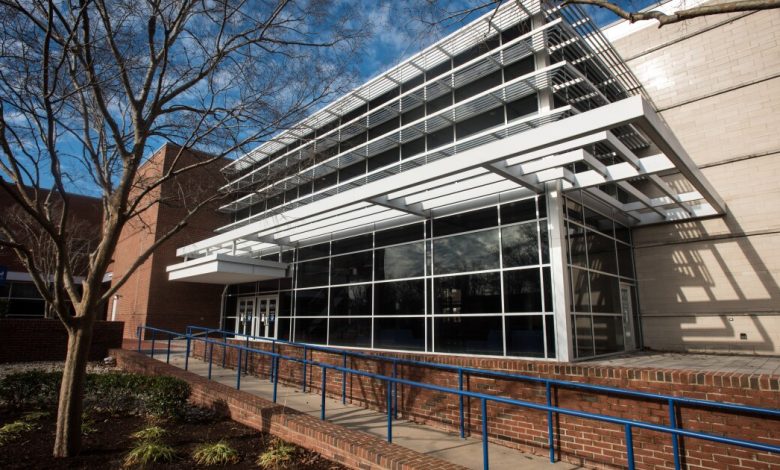
[ad_1]
The chancellor’s office had leaks in the roof — the result of years of deferred maintenance and hurricane damage. Trash cans caught the dripping water when it rained. In front of the administration building, a swamp-like field of retained water and diseased trees greeted students near the main campus entrance.
With enrollment down 59 percent, the 130-year-old historically Black university was on the verge of collapse. The institution saw four chancellors, two of them interim, in four years, amid a series of campus scandals that had wrecked morale. At one point, state leaders even considered closing the university for good.
It would take something unorthodox to save the institution: a first-of-its-kind college-affordability program called NC Promise.
While costs are topping $75,000 a year at some universities, NC Promise lowers tuition to $500 per semester for in-state students and $2,500 for out-of-state students at three campuses in the University of North Carolina system. There’s no income limit, means testing, or any other red tape. The eye-catching price tag applies to any student enrolling at ECSU, the University of North Carolina at Pembroke, and Western Carolina University.
Normally cost-averse politicians are ponying up tens of millions of dollars — $66 million this year and $82.5 million next year — to pay for the program. “It’s sort of Bernie Sanders’s ideas brought to you by conservative Republicans,” said Steve Long, a former member of the governing board that oversees the system’s 17 institutions.
This investment in the state’s public colleges stands in striking contrast to other prominent statewide fights. NC Promise came from the same lawmakers who’ve been feuding with the UNC system for years — over what to do with Confederate monuments, how to handle Covid-19 prevention measures, and whether to grant tenure to Nikole Hannah-Jones, the journalist who covers civil rights and racial justice.
When Republicans first proposed NC Promise, in 2016, it drew skepticism from the left. Two higher-ed researchers wrote that it “looks more like political posturing cloaked in the veil of access and affordability.” The Rev. William Barber, then head of North Carolina’s NAACP chapter, called the program “trickery” that could “drain and bankrupt” the universities. Fierce backlash led two HBCUs — Fayetteville State University and Winston-Salem State University — to ask to be removed from the program.
Today, however, it’s hard to find much opposition to NC Promise. Enrollment is up at the three founding universities, including a nearly 50-percent jump at ECSU, and Fayetteville State will join the program this fall. Campus leaders are profusely thanking the same Republicans who were once accused of having ulterior motives.
Proponents say the economics are simple: The legislature has invested in some of the state’s universities with room to grow, and they have done just that. Perhaps it’s a model for uplifting regional public colleges.
But questions remain. During the pandemic, enrollment at the NC Promise institutions has plateaued. The low tuition is clearly attracting transfer students but appears less effective at winning over first-year students. It’s too early to tell if the program is making the impact its founders intended: lowering student debt, increasing graduation rates, and spurring local economic growth.
The biggest question of all is whether it will end up outgrowing politicians’ willingness to pay for it.
But ECSU has always had challenges, like a lack of funding. Fewer than 30 percent of students graduate in four years; 40 percent graduate in six years. And it feels far away. The rural, 100-acre main campus, dotted with mostly red-brick buildings, is a mile and a half from downtown Elizabeth City, and the commercial fast-food strip is more than two miles away.
What’s more, ECSU is in one of the most geographically isolated regions of the state. People typically don’t stumble upon ECSU by accident; some might forget it’s there. Only one small newspaper regularly covers the town.
In the early 2000s, the university was doing OK. Enrollment was growing, reaching a high of 3,300 students in 2010. At one point, the dorms ran out of room.
Then came blow after blow: recession-related budget cuts, tighter minimum admission standards across the UNC system, and leadership failures.
In 2013, Elizabeth City’s police department found that campus law enforcement had failed to investigate more than 100 crime reports dating back to 2007, including 18 sexual-assault reports. The State Bureau of Investigation got involved, and the university’s chancellor resigned. A consultant’s review concluded that ECSU was out of compliance with the Clery Act, the federal campus-safety law.
Three years later, an audit commissioned by the UNC system found that ECSU officials were enrolling students who didn’t meet admission standards and doling out financial aid to students who didn’t qualify, in an apparent desperate attempt to stem enrollment losses. The findings led ECSU’s accreditor to send the university a formal public warning — which threatened the university’s access to federal financial aid.

Kate Medley
As ECSU’s student body shrank — by hundreds of students each year — so did its budget. The number of full-time instructional faculty members fell 40 percent between 2011 and 2016.
By the fall of 2016, ECSU enrolled just 1,357 students.
When Republicans assumed control of the North Carolina legislature, in the first half of the 2010s, they slashed higher-ed funding. But as the state recovered from recession-era budgets, Jim Blaine, former chief of staff for the state Senate’s top Republican, Phil Berger, said that Berger wanted to invest in the UNC system.
A few members of the UNC system’s board and state lawmakers were discussing what to do about ECSU and several other minority-serving institutions, given their declining enrollments and low graduation rates, Blaine said. Campus closure was quickly nixed as a tenable option, he said.
In late 2015, Blaine’s wife whisked him away to Aruba, his first vacation in years. But they weren’t seated together on the plane ride there. So he had four hours of uninterrupted time to pore over spreadsheets and think about how Republicans could make their mark on higher ed.
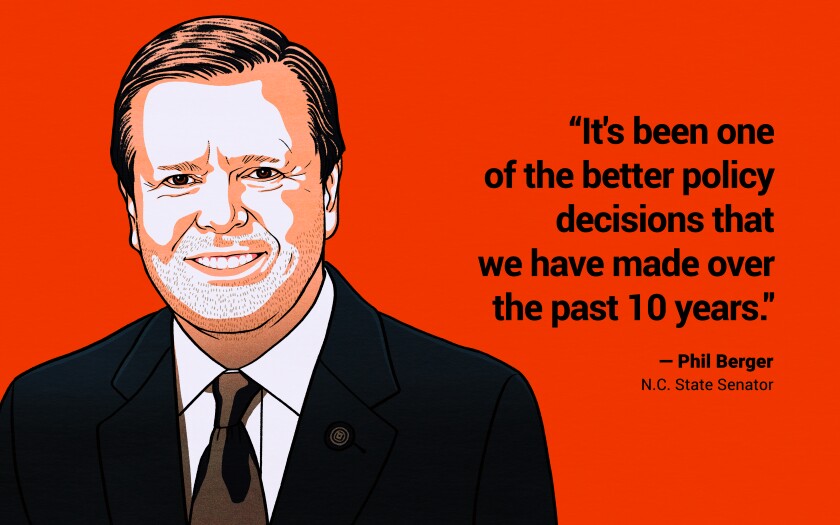
Illustration by Lily Qian
Blaine said that Berger wanted to put the brakes on tuition increases. He knew that North Carolina had an unusual state constitutional provision that required higher education to be as free “as practicable.” He knew that university leaders wanted to increase degree attainment and encourage more out-of-state students to come to North Carolina for college and stay after graduation.
He concluded that a state tuition subsidy for universities with room to grow — ECSU chief among them — wouldn’t cost the legislature that much. But it could go a long way.
Nationwide, Promise programs are designed to increase college going and make college more affordable, but they vary widely. The state-funded Tennessee Promise targets community colleges, as many legislative investments do. The donor-funded Kalamazoo Promise, in Michigan, targets one specific city and low-income school district and gives its students a scholarship to cover tuition and fees at public and eligible private universities in Michigan.
Some programs have income thresholds or requirements that students maintain certain grades. NC Promise is striking in its simplicity: low tuition, for everyone.
Of course, low tuition alone wouldn’t reverse ECSU’s troubles. The campus also had to be the sort of place that students would want to come to, said Karrie G. Dixon, who became chancellor in 2018.
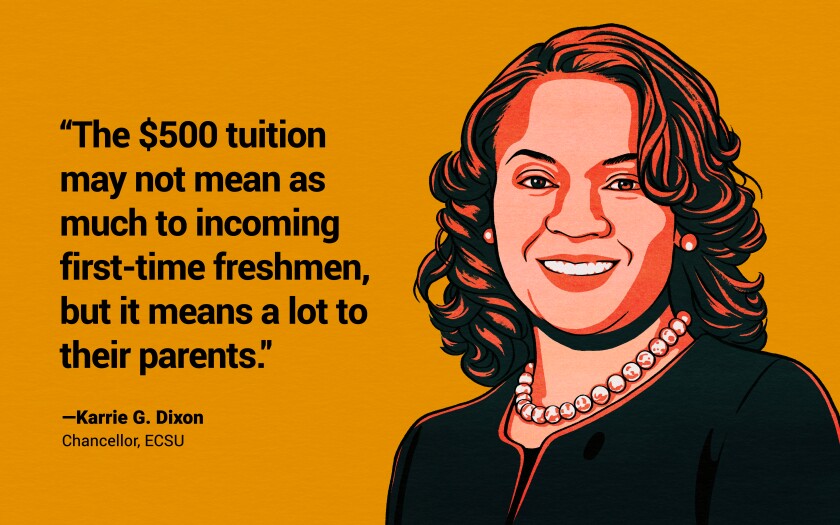
Illustration by Lily Qian
“If I’m trying to sell this institution to a prospective family,” Dixon said, “if they came into my office and saw that I was catching water in trash cans in my office, what would they think about the campus?” So she set out to make some cosmetic fixes.
Early in her tenure, several buildings got exterior touch-ups. Flowers were planted, and the grass was cut. The swamp in front of the administration building became a usable field for recreation and events.
Aviation science, the university’s marquee academic program, was moved from a gray, drab building with narrow windows to a glassy, modern facility that stands out on the western edge of campus, dubbed the STEM Complex. Soon, thanks to state funding, aviation science will have its own brand-new building to house its simulation labs and other training spaces for aspiring pilots, air-traffic control officers, and drone operators.

Kate Medley
The carpet in the chancellor’s office suite used to be green, Dixon said, and some of the walls were pink. Now the whole administration building is decked out in blue and white, the university’s colors. A tall blue banner flashing $500 and $2,500 price tags greets visitors as they walk in: “Have you heard about North Carolina Promise?”
To really take advantage of NC Promise, the university also needed to have an enrollment strategy. Cognizant that the number of high-school graduates in the immediate region was declining, ECSU staff fanned out farther across the state, hoping to draw more students from as far away as Charlotte, a five-hour drive.
“The $500 tuition may not mean as much to incoming first-time freshmen,” Dixon said. “But it means a lot to their parents.” Residential students are still on the hook for fees, room, and board, but Pell Grants and other financial aid can cover much of that cost, Dixon said.
The university also tried to market heavily to adult learners, veterans, and, above all, transfer students. Early on, Dixon traveled to seven nearby community colleges. The effort resulted in revamped articulation agreements, which enabled students to more easily transfer to the university after receiving their associate degree. Students who commute to campus or take online classes only have to pay for the sharply discounted tuition and two mandatory fees.

Kate Medley
Every ECSU student interviewed on campus on a recent morning knew about NC Promise, though many out-of-state students had only learned about it when they got to campus. It wasn’t a chief decision-making factor for Marqkieta Augustine, a first-year student from Louisiana who came to ECSU to study aviation. Though it was a plus: “You’re telling me the tuition is $2,000? Great!”
But for Charity Bond, NC Promise was the draw. Bond, a transfer student majoring in social work, learned about the program while earning her associate degree at Richard Bland College, a two-year institution in Virginia. “That’s why I commute so far,” said Bond, who lives in Williamston, N.C., about an hour drive away.
Within a year of NC Promise’s low tuition taking effect, ECSU’s enrollment was up nearly 20 percent.
In an interview, Dixon described NC Promise as a game changer. But Dixon herself was a game changer, too — especially at a university where faculty and staff members had become accustomed to seeing chancellors quickly walk out the door.
Dixon was clear and straightforward, warm but not emotive, as she explained why she took on the difficult task of leading ECSU. She talked matter of factly about doing what needed to be done. “It was a call to duty,” she said. She had spent a decade at the UNC system as a top academic and student affairs official, and she knew what was going on at ECSU. She said that Margaret Spellings, then the system’s president, told her: “I need your help.”
“No one wants to see any of our UNC institutions fail,” Dixon said.
Dixon said she’s excited to continue proving to the state legislature how well NC Promise is working, and how good of an investment ECSU is.
With a $140-million windfall approved in the new two-year state budget, ECSU is getting the kind of money that makes some people on campus wonder: Is this real?
“The answer was no,” Berger said. The facilities weren’t up to par because of “what we felt was neglect over the years” at the state’s HBCUs, he said. That’s why the legislature, full of one-time money from federal Covid-relief legislation, invested so much in ECSU’s infrastructure in the latest budget.
But Berger is proud of how much good NC Promise has already done. He noted that the program also froze all UNC-system students’ tuition at the same level for four years, and created a new merit scholarship for North Carolina A&T State University and North Carolina Central University, two other HBCUs. “It’s been one of the better policy decisions that we have made over the past 10 years,” he said. He’s effusive in his praise for Dixon’s leadership at ECSU: “She has been exactly the right person in the right place at the right time.”
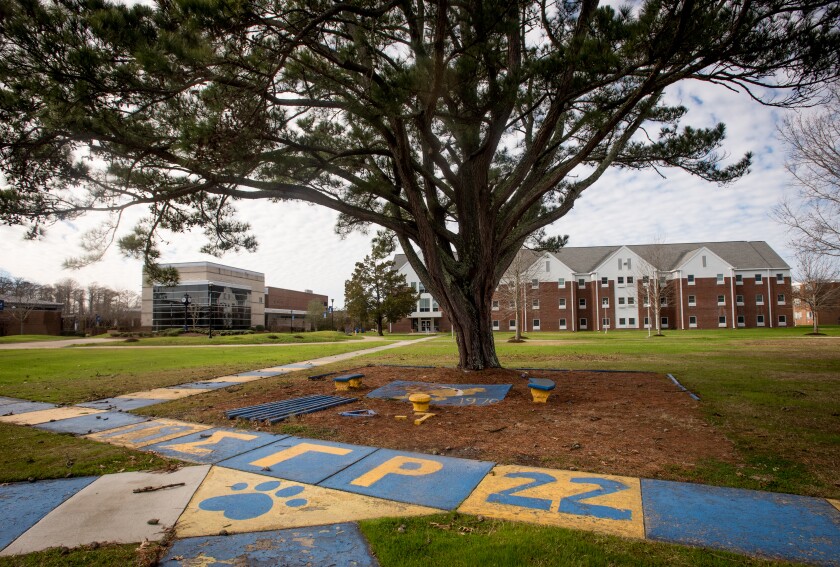
Kate Medley
The legislature chose ECSU; UNC-Pembroke, a historically Native American institution; and Western Carolina, a far-flung campus in the Great Smoky Mountains, for NC Promise based largely on their location in economically depressed areas. The northeast region, where ECSU is located, has struggled for a long time, Berger said, and yet it’s next to the fast-growing Virginia Beach. How could North Carolina reap those benefits?
“One of the things that is needed is an attractive, competitive university,” Berger said, and NC Promise’s $2,500 out-of-state tuition is a bargain.
Notably absent from interviews with university leaders and Republican lawmakers was any mention of recent culture-war fights, like the one involving Hannah-Jones, the Pulitzer Prize-winning journalist and author of the “1619 Project.” Conservative backlash to UNC-Chapel Hill’s attempt to hire Hannah-Jones last year led to a national uproar over academic freedom and race.
The contrast isn’t lost on university officials who argue that initiatives like NC Promise are much more influential than headline-grabbing political disputes.
“It’s been at times frustrating for leadership in the state that the good work that’s being done to maintain and enhance — and in some cases, dramatically enhance — affordability just seem to not register,” said Andrew Kelly, vice president for strategy and policy at the UNC system.
Initially, many people weren’t sure what to think about NC Promise — especially at the HBCUs, where leaders feared that they were going to lose all of their tuition revenue and face a financial crisis.
It was “some of the most contentious legislation I worked with in my 14 years in the Senate,” said Tom Apodaca, formerly one of North Carolina’s most powerful state senators, who retired from the state Senate in 2016. “I got more calls on NC Promise than on abortion.”
When Apodaca sat down with the state’s Legislative Black Caucus to talk about NC Promise, he faced vitriol, he said. As he recalled it, one caucus member came to his rescue and implored her colleagues: “This is not racist.”
Fayetteville State, Apodaca said, was the loudest opponent. In an email interview, James Anderson, the university’s chancellor at the time, disputed that he was ever opposed to the idea of NC Promise. He was frustrated that lawmakers didn’t include him or other HBCU chancellors in early discussions, when the program was supposed to target the HBCUs. Alumni were asking questions, and he didn’t have answers, he said.
Anderson also wanted a guarantee that the legislature would replace Fayetteville State’s lost revenue, which wasn’t initially in the bill, he said. Apodaca said that he talked to several chancellors shortly after the bill was drafted, and that the final legislation addressed Anderson’s concerns.
Darrell T. Allison, Fayetteville State’s current chancellor — a former member of the UNC system’s governing board who was hired in a cloud of controversy last year — declined an interview request for this article. Fayetteville State will join NC Promise starting this fall.
Many HBCU leaders and advocates feared that Republican lawmakers were trying to erase the identities of historically Black colleges like ECSU, said Zack Hawkins, a 2001 ECSU graduate who now serves in the state House of Representatives. “That was loud and clear — that if you take such a heavy hand, it can’t be for a good reason,” Hawkins, a Democrat, said.

Kate Medley
ECSU’s enrollment had been about 80-percent Black until 2010. The share of white and Hispanic students has gradually increased since then, and the student body is now two-thirds Black. But since NC Promise took effect, the share of Black students at ECSU has held steady.
Hawkins and Anderson now support the program. “I am glad to see that the NC Promise schools are thriving,” Anderson said. He added: “I hope other states adopt such a successful model and include the potentially affected schools in the early discussions.”
The initial skepticism of NC Promise was rooted in uncertainty, current university leaders said, and the fact that no one had seen a program like it. Administrators were wondering, for instance, whether $500 tuition would cheapen degrees.
Those concerns have dissipated. “When you put students first, people come together,” said Kelli R. Brown, the chancellor of Western Carolina. “You’ve gotta give North Carolina and the General Assembly credit,” Brown said, “for really thinking out of the box.”
The NC Promise universities are even more reliant on state funding coming through, which can create anxiety when budget impasses inevitably occur. And lawmakers often stress that current legislatures can’t bind future ones.
Berger’s office said there was no sunset date and that NC Promise is included in the state’s base budget, so it would take a legislative vote to remove it.
Berger has money on his mind, though. He said state lawmakers may consider an enrollment cap in the future. In other words, he said: “What’s the maximum number of students that we would want to be at a particular campus?”
“We don’t want to have a situation where the financial requirements of keeping a campus in Promise gets to the point where there’s even the temptation or the need for us to make a change that would eliminate or stop the program,” Berger said.
Still, Berger was strongly opposed to placing income limits on which students and families could take advantage of the low tuition. “The reason this program has been so successful is because it’s not like ordinary government means-tested programs,” he said. “If we go down that road, we will have lost, in my opinion, kind of the magic of what makes this work.”
Robin G. Cummings, chancellor of UNC-Pembroke, said he believes the state’s NC Promise investment will be sustained for at least the next five to 10 years.
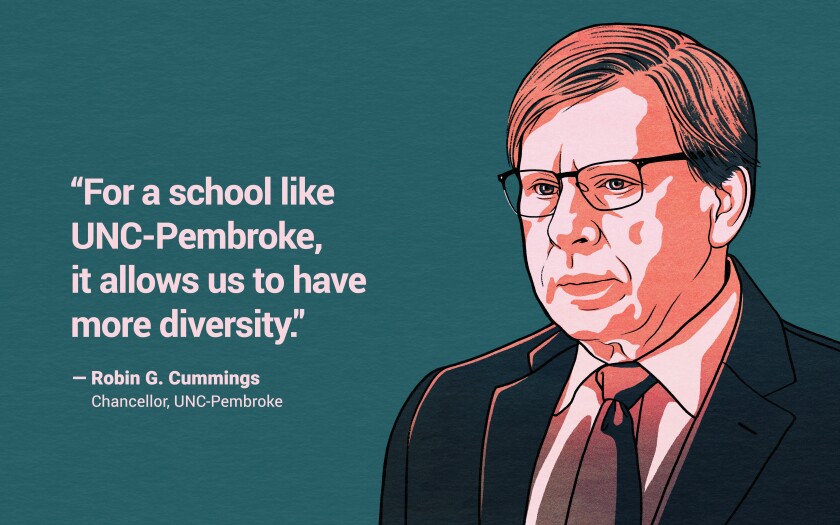
Illustration by Lily Qian
Cummings said he’s surprised that the low tuition is available even to international students, who effectively receive a $40,000 scholarship. But UNC-Pembroke is embracing it. The university is also trying to enroll students from 50 to 100 different Native American tribes. “For a school like UNC-Pembroke, it allows us to have even more diversity,” Cummings said.
Like ECSU, UNC-Pembroke got an unprecedented investment in the latest state budget. But Cummings said he’s trying to be realistic about the future.
“Sen. Berger gets upset if I say: Senator, when will NC Promise go away? Well, what makes you think it’s going to go away?” Cummings said. “But I know that Sen. Berger one day won’t be in the office.”
Another pressing question, with Fayetteville State joining this fall, is how much more NC Promise will grow. Deanna Ballard, a Republican senator from western North Carolina, wasn’t sure how much the program would expand. “Part of its uniqueness is that it’s pretty tailored to a limited number of universities,” she said.
But Cummings said he’s heard rumblings about expanding the low tuition to much of the UNC system. Apodaca said that other UNC-system campuses are asking to join, though he declined to name which ones. Currently, just 12 percent of the system’s undergraduates are covered by NC Promise.
So far, Klasik said, NC Promise has not led to an increase in first-year enrollment at the three founding universities. But it has led to a significant jump in transfer students. “It seems like they’re opening an attractive and affordable path to a four-year degree for students who started at community colleges,” he said.
And even though first-year enrollment didn’t change much, the composition of those students might have changed, Klasik said. He’s curious whether NC Promise is leading to growth in Pell-eligible students or students from different geographic regions, for instance. While most students attend college close to home, he’s wondering whether lower tuition is prompting students to go to colleges that are farther away.
“When you change tuition so dramatically for a certain subset of colleges, that changes students’ thinking about how they decide where they want to enroll,” Klasik said. Making tuition cheaper will likely encourage students to move toward those campuses. But how will that affect the state’s other universities and community colleges?
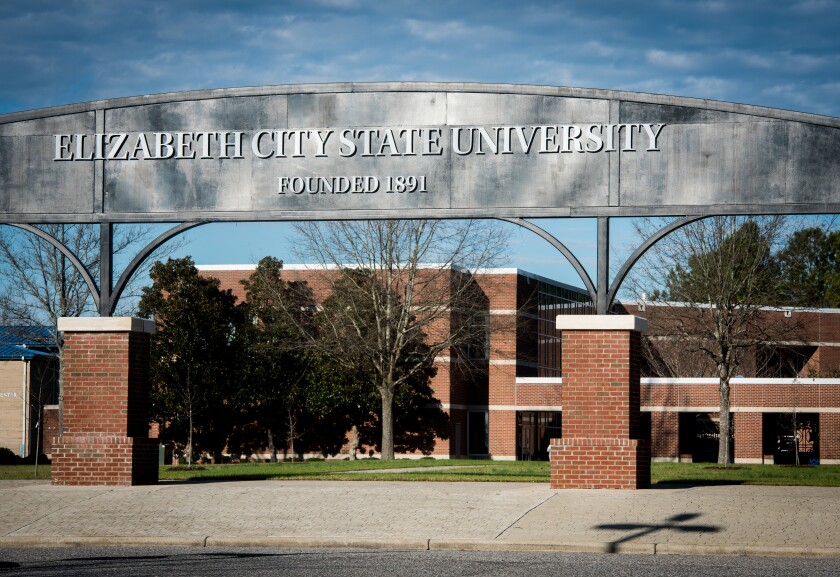
Kate Medley
One concern is that the NC Promise campuses could draw in all of the existing transfer students, instead of encouraging more students over all to go to college.
Research has shown that other Promise programs have encouraged more students to go to college and increased completion rates. Tennessee Promise has helped increase the number of students who file a federal student-aid application, even if they don’t all go to college right away. The UNC system is looking at whether student debt is declining, as well as whether students drawn by NC Promise actually complete their degrees.
While the jury is still out on its long-term success, there’s no question that the program — along with ambitious leadership — has worked wonders for Elizabeth City State University.
Jimmy Chambers, ECSU’s student-body president, was won over by NC Promise. Chambers, who’s from the Charlotte area, transferred in early 2019. Tuition and fees for one semester at his former institution, Chowan University, cost $13,000. At ECSU, his entire degree won’t even cost that much.
Chambers hoped that other students would see how ECSU could work for them, too. “It’s a huge hidden gem,” he said, “that sometimes people overlook.”
This story was jointly reported and edited by The Chronicle and The Assembly. Kyle Villemain contributed reporting.
[ad_2]
Source link






